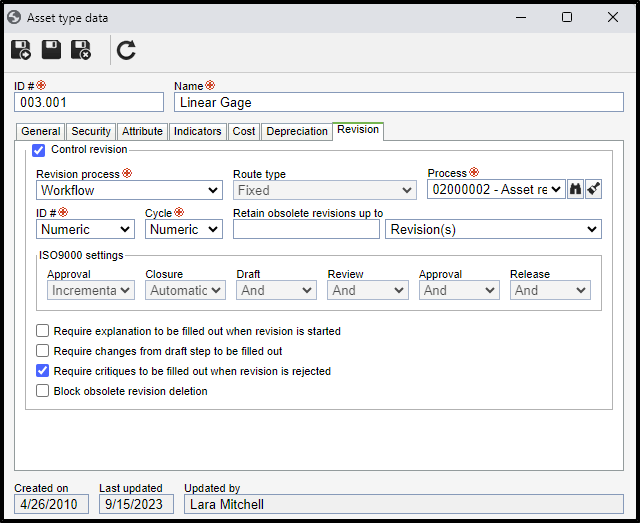Asset - 2.2.1
Adjustments in Web service documentation
In this version, the Activity plan and Downtime record web services are part of the SoftExpert Maintenance documentation, rather than SoftExpert Asset.
In this case, if you use one of these integration points:
- ASTPLANACT - Activity plan import;
- ASDOWNTIME - Downtime record import;
- importAssetDowntime;
- importPlanActivity;
It will be necessary to revise the configurations and perform the necessary adjustments for these services to continue operating correctly.
Enabling the change of asset type revision controls
In previous versions, the asset type revision control (no revision control, ISO9000-based revision, or revision via Workflow) was blocked after adding an asset to the type. That is, it was not possible to configure a type without revision control and, after adding assets to the type, editing this control to have revision.
From this version onwards, the user can perform two adjustments:
- Allowing a type without revision control to be configured to have revision control.
- Changing the revision control type from ISO9000-based to Workflow and vice-versa.

It is not possible to remove the revision control from a type that already had it.
Asset event web service
A new web service has been developed in the system for the check-out for usage event.
It has the basic data from the usage event, aiming to facilitate the integration with other SoftExpert Suite components.
This feature enables check-out for and check-in from usage; thus, new options can be added, such as fields and events for maintenance and calibration.
New security structure for asset type and dynamic navigator
From this version onwards, aiming to have better performance of the access controls, the component securities work with access profiles.
It is now possible to create and manage profiles through a new menu, creating them as needed.
For example: the view profile, which only has the "List" and "View" controls, or the manager profile, which has all the controls.
After creating the permission profile, it can be associated with the asset type and the dynamic navigator, providing information to users, departments, positions, and teas.
This new dynamic improves the visibility and management of access controls.
View the latest improvements made to this component: